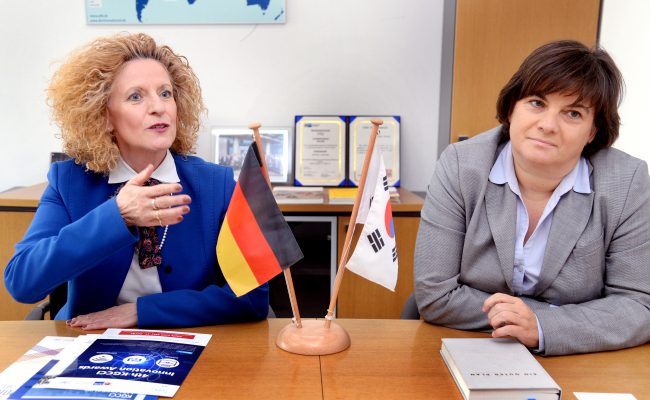[Doing Biz in Korea] ‘Korean women are underestimated in leadership’
KGCCI, which runs world-renowned Ausbildung project, underlines importance of unbiased education for successful entrepreneurship
By Shin Ji-hyePublished : May 16, 2018 - 16:39
The Korea Herald is publishing a series of features and interviews on South Korea’s business environment for foreign companies and investors. This is the eighth installment. -- Ed.
Despite having impressive power, knowledge and leadership, Korean female leaders are underestimated due to cultural and social barriers, according to the chief of the Korean-German Chamber of Commerce and Industry.
“Careers of females have never been easy anywhere. But, it seems a bit more in Korea,” said Ingrid Drechsel, chairman of the KGCCI and president of Bayer Korea, in an interview with The Korea Herald. The interview was also joined by Susanne Wohrle, project manager of the Ausbildung project at the KGCCI.
Drechsel has been the chief of the Korean arm of the German pharmaceutical company Bayer since January 2015. She was appointed German chairman of the KGCCI in May last year after around 30 years of experience in the pharmaceutical field in Germany, Japan and Indonesia.
The KGCCI is the second-largest international chamber of commerce in Korea with around 500 members.
“I found Korean females have power, knowledge and leadership but somehow they are underestimated. Despite having such merits, they seem to lack self-confidence,” Drechsel said.
This may be because Korean parents teach their children in different ways based on their gender and the cultural belief that speaking up to seniors is deemed rude, especially in educating girls, according to the chief.
Despite having impressive power, knowledge and leadership, Korean female leaders are underestimated due to cultural and social barriers, according to the chief of the Korean-German Chamber of Commerce and Industry.
“Careers of females have never been easy anywhere. But, it seems a bit more in Korea,” said Ingrid Drechsel, chairman of the KGCCI and president of Bayer Korea, in an interview with The Korea Herald. The interview was also joined by Susanne Wohrle, project manager of the Ausbildung project at the KGCCI.
Drechsel has been the chief of the Korean arm of the German pharmaceutical company Bayer since January 2015. She was appointed German chairman of the KGCCI in May last year after around 30 years of experience in the pharmaceutical field in Germany, Japan and Indonesia.
The KGCCI is the second-largest international chamber of commerce in Korea with around 500 members.
“I found Korean females have power, knowledge and leadership but somehow they are underestimated. Despite having such merits, they seem to lack self-confidence,” Drechsel said.
This may be because Korean parents teach their children in different ways based on their gender and the cultural belief that speaking up to seniors is deemed rude, especially in educating girls, according to the chief.

“I think Korea is in a transition phase, so more and more females are well-educated, going into businesses, having good jobs and getting independent,” she said, adding, “But, this is not so long. Society is now getting used to it.”
The corporate environment is also another barrier for female leadership.
The typical Korean corporate culture of working hard and drinking in the evening also makes things difficult for women, she said, adding that husbands expect their wives to be home early to care for their kids and to do household chores.
“That is a little different in Germany,” where companies try to provide a balance for their employees between working time and free time. The burden of working mothers in Germany is also lighter compared to Korea, according to Drechsel.
“Even in Germany we have not reached to the level that it should be. It will take time and we have to be insistent,” she said.
The chairman urged women to step outside of their comfort zone and create their own networks that can rival the traditional way of forming connections among men.
Apart from the gender issue, the Korean education and labor markets need to be more flexible, according to the KGCCI.
Whenever she has an opportunity to mentor Korean women, she always says to them, “Please network.”
Susanne Wohrle also offered her opinion, saying she found it extremely difficult for Korean youths to get into the labor market.
“There are way too many educated people, which makes competition fiercer. The other part who are not educated, they do not get appreciation at all,” Wohrle said.
According to government statistics, Koreans entering college make up around 80 percent, the highest among member nations of the Organization for Economic Cooperation and Development.
Still, youth unemployment is more than 10 percent and the proportion of nonregular workers among youths reached 50 percent this year.
“I met a lot of Korean students for the Ausbildung project. The education system in Korea is very strict and always tells students what to do. After school, they don’t have any clue of what they should do all of sudden,” Wohrle said.
To offer a more practical solution, the KGCCI has introduced its recognized training project here, called Ausbildung, a form of vocational training or apprenticeship in which a student attends school and works simultaneously.
Since its launch here in September, around 90 Korean high school students have been selected for the first batch to join the project. They are currently working for service centers of BMW Korea and Mercedes-Benz Korea. After three years of job training and education, they will become regular employees of the two firms, according to Wohrle.
The project is aimed at teaching participants how to be successful in the corporate world, such as working in teams, having curiosity and being proactive and open-minded.
“For the first generation, we have only 5 percent of dropouts. We ‘fear’ that other companies will hire them at the end of training because they are so capable,” she said.
The KGCCI will accept the second generation of students in September, with two new German companies, MAN Truck and Daimler Trucks, slated to join.
She said many German leaders currently at the top of big companies also came out of this education system, including Ausbildung and Meister.
The KGCCI is now closely working with the Korean Ministry of Education, the Ministry of Labor and KOTRA with the aim of spreading this education program and integrating it into Korean companies.
Wohrle expressed hope for further expansion of Ausbildung, citing the summit between German President Frank-Walter Steinmeier and South Korean President Moon Jae-in in February in Seoul.
“When the two presidents from Germany and Korea met months ago, they talked about the Ausbildung program. We hope this project gets more prominent here,” Drechsel said.
By Shin Ji-hye (shinjh@heraldcorp.com)


![[AtoZ into Korean mind] Humor in Korea: Navigating the line between what's funny and not](http://res.heraldm.com/phpwas/restmb_idxmake.php?idx=644&simg=/content/image/2024/04/22/20240422050642_0.jpg&u=)


![[Herald Interview] Why Toss invited hackers to penetrate its system](http://res.heraldm.com/phpwas/restmb_idxmake.php?idx=644&simg=/content/image/2024/04/22/20240422050569_0.jpg&u=20240422150649)
![[Graphic News] 77% of young Koreans still financially dependent](http://res.heraldm.com/phpwas/restmb_idxmake.php?idx=644&simg=/content/image/2024/04/22/20240422050762_0.gif&u=)








![[Exclusive] Korean military to ban iPhones over security issues](http://res.heraldm.com/phpwas/restmb_idxmake.php?idx=652&simg=/content/image/2024/04/23/20240423050599_0.jpg&u=20240423171347)



![[Today’s K-pop] Ateez confirms US tour details](http://res.heraldm.com/phpwas/restmb_idxmake.php?idx=642&simg=/content/image/2024/04/23/20240423050700_0.jpg&u=)